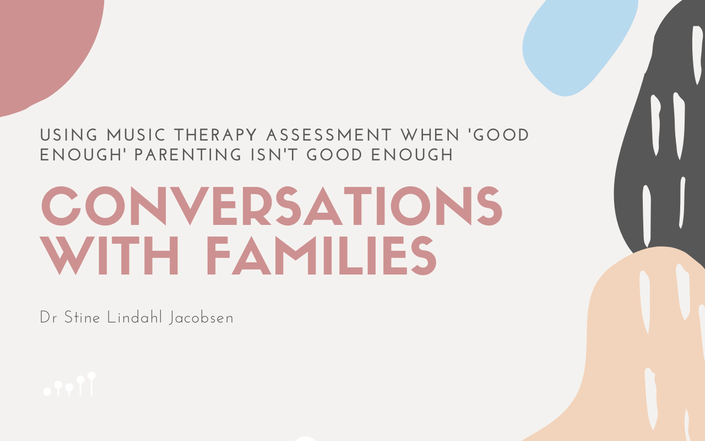
Conversations with families
Using music therapy assessment when 'good enough' parenting isn't good enough
Get started now!
Assessment and Communication in Music Therapy: Building Confidence in Difficult Conversations
Looking to strengthen your assessment skills and communicate more effectively with families? Whether you're navigating complex client needs or seeking clearer ways to share clinical observations, this comprehensive tutorial from Dr. Stine Lindahl Jacobsen offers practical strategies to enhance your assessment practice—and your confidence in those challenging conversations.
Dr. Jacobsen, an experienced clinician and researcher, presents an inspiring exploration of ethical assessment and compassionate communication. She begins with the foundational understanding of why quality assessment matters and how it can transform both your clinical clarity and your clients' engagement in the therapeutic process.
You'll learn:
- Ethical assessment principles and how to gather meaningful, individualized client data
- Effective communication strategies for sharing clinical observations with families and clients
- How to use assessment findings to create more specific, relevant, and motivating goals
- Techniques for managing difficult conversations with sensitivity and professionalism
- An in-depth look at the Assessment of Parent-Child Interaction (APCI) as a model for meaningful music therapy assessment
This tutorial is ideal for music therapists who want to build confidence in their assessment skills, develop better communication with families, or create more targeted therapeutic goals based on solid clinical observations.
It also includes case studies from Dr. Jacobsen's clinical practice and practical strategies for turning assessment data into clear, actionable information that supports both therapeutic progress and family understanding. The tutorial features optional bonus homework activities designed to deepen your learning and earn you additional CMTE/CPD credits.
Whether you're new to formal assessment or looking to refine your approach to complex family dynamics, this tutorial will inspire new ways to use assessment and communication with purpose, ethics, and therapeutic impact.
Your Instructor

Stine Lindahl Jacobsen, Ph.D, is an Associate Professor and Head of Art, Health & Technology Education, and Head of the Music Therapy Research Group at Aalborg University. She is also Head of the Regional Arts and Health Center at AAU and the Head of the International Music Therapy Assessment Consortium. She has developed a validated music therapy measure called the Assessment of Parent-Child Interaction (APCI) and trains music therapists and researchers internationally. Publications include edited book chapters, manuals and articles and she has given numerous lectures and keynotes all around the world. Her clinical & research areas mainly include arts and health, families, effect studies and music therapy assessment.
Earn 5+ CMTE/CPD credits quickly and easily!
Course Curriculum
-
Preview1. Introduction, overview and learning outcomes (5:15)
-
Start2. Assessment: The systematic collection, analysis and interpretation of client information (7:04)
-
Start3. Ethical assessment: Ensuring quality of treatment, striving for client independence & transparency, and building efficacy & confidence as a therapist (7:51)
-
Start4. APCI: Assessment of Parent-Child Interaction (9:32)
-
Start5. Planning your feedback: How to manage difficult conversations with clients (9:09)
-
Start6. Case studies: Where difficult conversations can provide clarity and validation (10:51)
-
Start7. Summary, bonus content and extra resources (3:21)


Frequently Asked Questions
| For MT-BC’s in the US and Canada you can submit your certificate in the workshops/independant learning category as an ‘other continuing education opportunity’. You can use the following CBMT Domains when you submit your CMTE certificate. |
| II Referral, Assessment, Interpretation of Assessment, and Treatment planning. |
| B. Assessment. 1. 2. 3. 4. 5. 7. 8. 9. 10. 11. 12. 13. |
| C. Interpret Assessment information and Communicate results. 3. 5. |
| III Treatment Implementation and Documentation |
| A. Implementation. 1 a, b, c, d, e, f, g. 2. |
| V Professional Development & Responsibilities |
| A. Professional Development. 1. 2. 3. 6. |

